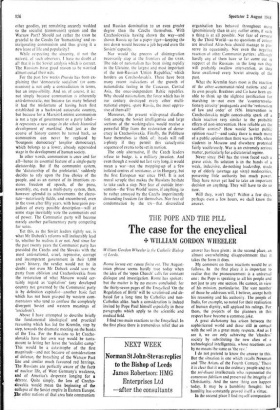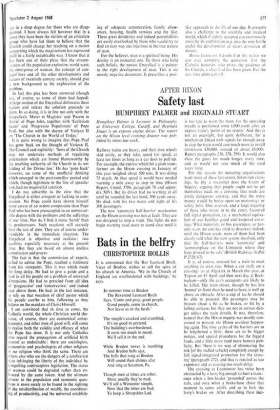The case for the encyclical
THE POPE AND THE PILL 4. WILLIAM GORDON WHEELER
William Gordon Wheeler is the Catholic Bishop of Leeds.
Roma locuta est: causa finita est. The August- inian phrase seems hardly true today when the idea of the 'open Church' calls for constant dialogue and investigation. Rome has spoken : but the matter is by no means concluded; for the thirty-seven pages of the Encyclical 'On the Regulation of Birth' will be scrutinised and de- bated for a long time by Catholics and non- Catholics alike. Such a consideration is indeed invited by Pope Paul himself especially in those paragraphs which apply to the scientific and medical field.
I find two main reactions to the Encyclical. In the first place there is tremendous relief that an answer has been given : in the second place, an almost overwhelming disappointment that it takes the form it does.
My comment on these reactions would be as follows. In the first place it is important to realise that the pronouncement is a universal one : the Pope is speaking to all his people and not just to any one section. He cannot, in view of his mission, particularise. The vast number of those he addresses will, I believe, accept both his reasoning and his authority. The people of India, for example, so noted for their realisation of human dignity, will applaud his rulings. For them, the projects of the planners in this respect have become a common joke.
A great dichotomy has arisen between the sophisticated world and those still in contact with the soil in a great many respects. And as I see it, we are only achieving the 'classless' society by substituting the new class of a technological intelligentsia, whose reactions are by no means the same as 'the rest.'
I do not pretend to know the answer to this. But the situation is one which recalls Newman and 'The Arians of the Fourth Century.' There it is clear that it was the ordinary people and not the soi-disant intellectuals who represented the consensus fidelium and preserved the integrity of Christianity. And the same thing can happen today. It may be a humbling thought: but humility has constantly proved itself a virtue.
In the second place I find myself compassion-
ate in a deep degree for those who are disap-
pointed. I have always felt however that in a sense they have been the victims of an articulate
group who have led them to believe that the Church could change her teaching on a matter concerning which the magisterium has expressed
itself in a fairly indubitable way. I know that it
has been one of their pleas that the circum- stances of the population explosion, world want,
the emergence of woman, the concept of con- jugal love and all the other developments and factors of twentieth century society, should give a new background to the exploration of the problem.
In fact this plea has been answered (though not, of course, as some of them had hoped).
A large section of the Encyclical delineates these factors and relates the solution precisely to them. In so doing, it is in line not only with the
Encyclicals 'Mater et Magistra' and 'Pacem in Terris' of Pope John, together with 'Ecclesiam Suam' and 'Progressio Populorum' of Pope Paul, but also with the decree of Vatican II on 'The Church in the World of Today.'
It is quite wrong to imagine that Pope Paul has gone back on the thought of Vatican H.
The Council said explicitly : 'Sons of the Church may not undertake methods of regulating procreation which are found blameworthy by the teaching authority of the Church in its un- folding of the Divine law.' He has 'gone back' however, on some of the unofficial thinking which emerged in the post-conciliar period and which, though legitimate in the line of specula- tion, had no magisterial sanction.
I do not subscribe to the view that the Encyclical is either arrogant or lacking in com- passion. No Pope could have shown himself more aware of an ardent compassion than Pope Paul who has been preoccupied in an unmeasur- able degree with the problems and the sufferings of our time. Nor do I find it more 'harsh' than its predecessors. Such reactions will scarcely bear the test of time. They are of course under- standable in the immediate situation. The Encyclical is objective and realistic: two qualities especially necessary at the present time. But they are based on almost endless consultation and prayer.
The fact is that the commission of experts, called to advise the Pope, reached a stalemate from his viewpoint. This it was which made the long delay. He had to give a guide and a lead to all his people on a problem of universal dimensions. He had to prescind from all idea of 'progressive' and 'conservative,' and indeed rose above them. He had, in the last instance, to rely on that vocation of chief pastor which his people ascribe to him, following as they believe on the mandate of Christ Himself.
I am convinced that in time to come, the Catholic world, the whole Christian world (be- cause, of course, there are ecumenical conse- quences), and other men of good will, will come to realise both the validity and efficacy of what the Pope has done. It is not only Catholics who regard the propagation of artificial birth control as undesirable: there are sociologists, economists and psychologists of other religions or no religion who think the same. There are others also who see the dangers of a totalitarian state infringing the liberty of the individual by compelling contraceptive legislation. The status of woman could be degraded rather than en- hanced by the same token. And the ultimate answer to the population and economic ques- tions is more surely to be found in the righting of the misdistribution of wealth, the coordinat- ing of productivity,,and the universal establish-
ing of adequate remuneration, family allow- ances, housing, health services and the like. These great desiderata and indeed potentialities are easily overlooked by those who would try to find an easy way out injurious to the true nature of man.
For the believer, man is a spiritual being. His destiny is an immortal one. To those who hold such beliefs, the newest Encyclical is a pointer to the right development of man. This is no merely negative document. It prescribes a posi-
tive approach to the ills of our day. It presents also a challenge to the scientific and medical world, which if rightly accepted can enormously assist by its exploration (e.g. into the non-fertile cycle) the development of man's dominion of nature.
Roma forma eat. I doubt if in this matter we can ever complete the quotation. For the Catholic however, who prizes the guidance of his Church, a clear lead has been given. For the rest, time alone can tell.







































 Previous page
Previous page